Dagstuhl Seminar 17201
Formal Synthesis of Cyber-Physical Systems
( May 14 – May 19, 2017 )
Permalink
Organizers
- Calin A. Belta (Boston University - Brookline, US)
- Rupak Majumdar (MPI-SWS - Kaiserslautern, DE)
- Majid Zamani (TU München, DE)
Coordinator
- Matthias Rungger (TU München, DE)
Contact
- Susanne Bach-Bernhard (for administrative matters)
Cyber-Physical Systems (CPS) are complex systems resulting from intricate interaction of discrete computational devices with the continuous physical plants. Within CPS, embedded control software plays a significant role by monitoring and adjusting several physical variables, for example, temperature, velocity, pressure, density, and so on, through feedback loops where physical processes interact with computational devices.
With the growing trend in computational devices, embedded control software is becoming more and more ubiquitous in many safety-critical applications including automotive, aerospace, transportation systems, critical infrastructure, energy, robotics, healthcare, etc. Unfortunately, the design of embedded control software nowadays is still based on ad-hoc solutions resulting in brittle and error-prone software, and very high verification and validation costs.
In order to detect and eliminate design flaws and inevitable software bugs, a large portion of the design budget is consumed with validation and verification efforts, which are often lengthy. On the other hand, by changing the emphasis from verification to synthesis, it is possible to synthesize correct-by-design embedded control software for CPS while providing formal guarantees of correctness and preventing the need for costly post facto verifications.
This seminar focuses on automatic, correct-by-construction, and scalable synthesis of controllers for interacting discrete and continuous systems, namely, hybrid systems. It will bring together an inter-disciplinary team of computer scientists, control theorists, and researchers from industry to identify a unified methodology for controller synthesis of CPS and discuss potential issues especially raised in applying those techniques to industrial platforms, which require the tight collaboration between these communities. Towards achieving this goal, a merging of techniques between (continuous) control theory and (discrete) computer science is discussed in the following key areas:
-
1. Abstraction-based synthesis;
-
2. SMT-based synthesis;
-
3. Reactive synthesis;
-
4. Learning-based synthesis.
The research issues relevant to the synthesis of cyber-physical systems will be discussed during the seminar, including:
-
1. Scalability of the synthesis techniques for hybrid systems;
-
2. Platform-aware synthesis of hybrid systems;
-
3. Unifying concepts such as robust synthesis for discrete and continuous systems;
-
4. Distributed synthesis of hybrid systems.
This seminar will benefit the control as well as computer science communities by bridging the gap between the complementary concepts. It will be a unique opportunity for an active and productive interaction between these communities.
 Calin A. Belta, Rupak Majumdar, and Majid Zamani
Calin A. Belta, Rupak Majumdar, and Majid Zamani
Cyber-Physical Systems (CPS) are complex systems resulting from intricate interaction of discrete computational devices with the continuous physical plants. Within CPS, embedded control software plays a significant role by monitoring and adjusting several physical variables, e.g. temperature, velocity, pressure, density, and so on, through feedback loops where physical processes interact with computational devices. Recent advances in computation, storage, and networking have made tremendous advances in hardware and system platforms for CPS. With this growing trend in computational devices, embedded control software is becoming more and more ubiquitous in many safety-critical applications including automotive, aerospace, transportation systems, critical infrastructure, energy, robotics, healthcare, and many other domains. Unfortunately, the design of embedded control software nowadays is still based on ad-hoc solutions resulting in brittle and error-prone software, and very high verification and validation costs. In order to detect and eliminate design flaws and inevitable software bugs, a large portion of the design budget is consumed with validation and verification efforts, which are often lengthy. On the other hand, by changing the emphasis from verification to synthesis, it is possible to synthesize correct-by-design embedded control software for CPS while providing formal guarantees of correctness and preventing the need for costly post facto verification.
In recent years, there has been a lot of progress in designing automatic and correct-by-construction techniques for controller synthesis for interacting discrete and continuous systems. These new techniques have combined techniques from continuous control theory as well as from computer science. The focus of this seminar was to provide a state-of-the-art of this nascent but important field, and to describe challenges and opportunities for synthesis techniques to transition to the real world. By the nature of the topic, the participation at the seminar was inter-disciplinary, and consisted of computer scientists and control theorists, both from academia and from industry. Instead of a sequence of presentations of individual research results, the seminar was organized as a sequence of open discussions on topics of common interest to the participants, such as techniques for scalable controller synthesis, identification of application domains and recent success stories, compositionality and system design, end-to-end arguments about systems, as well as education and outreach.
This seminar benefitted the control as well as computer science communities by bridging the gap between many complementary concepts studied in each community. A more detailed survey on the topics of the seminar is in preparation.
Outcomes of the seminar
The seminar focused on the challenges in the application of formal synthesis techniques for automatic, correct-by-construction synthesis of CPS. The seminar had a total of 45 participants with a mix of computer scientists and control theorists.
Sessions
The seminar was organized as a sequence of open discussions led by one or two moderators. Each session had a scribe to note down the discussion. The scribe notes were shared with all participants, who added their comments or filled in more information. The updated notes were used to prepare the session summaries (in the next Section).
The following sessions were organized:
- Application domains, success stories, and obstacles to adoption
- Fundamental algorithmic and scalability challenges in formal synthesis
- Tools and infrastructure
- Education and outreach
- Data-driven and search-driven approaches to synthesis
- Compositionality in synthesis
- Optimality and completeness
- Synthesis of distributed protocols from scenarios and requirements.
- Specification languages
- Robustness and resiliency
- Explainability and user interaction
- End-to-end correctness
- Formal synthesis challenges in robotics
- Cyber-Security of CPS
 Calin A. Belta, Rupak Majumdar, Majid Zamani, and Matthias Rungger
Calin A. Belta, Rupak Majumdar, Majid Zamani, and Matthias Rungger
- Erika Abraham (RWTH Aachen, DE) [dblp]
- Murat Arcak (University of California - Berkeley, US) [dblp]
- Calin A. Belta (Boston University - Brookline, US) [dblp]
- Ivana Cerná (Masaryk University - Brno, CZ) [dblp]
- Samarjit Chakraborty (TU München, DE) [dblp]
- Chih-Hong Cheng (fortiss GmbH - München, DE) [dblp]
- Jyotirmoy Deshmukh (Toyota Motors North America, US) [dblp]
- Rüdiger Ehlers (Universität Bremen, DE) [dblp]
- Martin Fabian (Chalmers UT - Göteborg, SE) [dblp]
- Georgios Fainekos (Arizona State University - Tempe, US) [dblp]
- Antoine Girard (CNRS - Gif sur Yvette, FR) [dblp]
- Anak Agung Julius (Rensselaer Polytechnic Institute, US) [dblp]
- Roozbeh Kianfar (Zenuity, SE) [dblp]
- Hadas Kress-Gazit (Cornell University - Ithaca, US) [dblp]
- Jan Kretinsky (TU München, DE) [dblp]
- Stéphane Lafortune (University of Michigan - Ann Arbor, US) [dblp]
- Jun Liu (University of Waterloo, CA) [dblp]
- Rupak Majumdar (MPI-SWS - Kaiserslautern, DE) [dblp]
- Manuel Mazo (TU Delft, NL) [dblp]
- Sanjoy K. Mitter (MIT - Cambridge, US) [dblp]
- Sahar Mohajerani (Chalmers UT - Göteborg, SE) [dblp]
- Necmiye Ozay (University of Michigan - Ann Arbor, US) [dblp]
- Ivan Papusha (Univ. of Texas at Austin, US) [dblp]
- Nir Piterman (University of Leicester, GB) [dblp]
- Pavithra Prabhakar (Kansas State University - Manhattan, US) [dblp]
- Gunther Reißig (Universität der Bundeswehr - München, DE) [dblp]
- Harald Ruess (fortiss GmbH - München, DE) [dblp]
- Matthias Rungger (TU München, DE) [dblp]
- Indranil Saha (Indian Institute of Technology Kanpur, IN) [dblp]
- Anne-Kathrin Schmuck (MPI-SWS - Kaiserslautern, DE) [dblp]
- Sadegh Soudjani (MPI-SWS - Kaiserslautern, DE) [dblp]
- Paulo Tabuada (University of California at Los Angeles, US) [dblp]
- Wolfgang Thomas (RWTH Aachen, DE) [dblp]
- Hazem Torfah (Universität des Saarlandes, DE) [dblp]
- Stavros Tripakis (University of California - Berkeley, US) [dblp]
- Ashutosh Trivedi (University of Colorado - Boulder, US) [dblp]
- Jana Tumova (KTH Royal Institute of Technology - Stockholm, SE) [dblp]
- Marcell Vazquez-Chanlatte (University of California - Berkeley, US) [dblp]
- Majid Zamani (TU München, DE) [dblp]
Classification
- artificial intelligence / robotics
- modelling / simulation
- semantics / formal methods
Keywords
- Formal Synthesis
- Reactive Synthesis
- Correct-By-Construction Synthesis
- Cyber-Physical Systems
- Hybrid Systems
- Control Systems

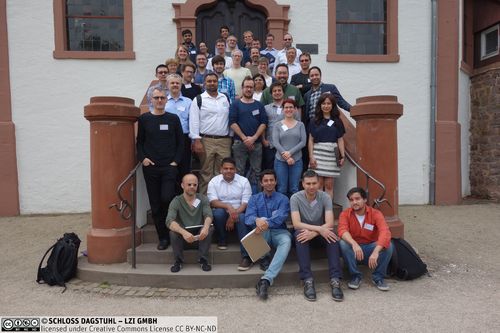
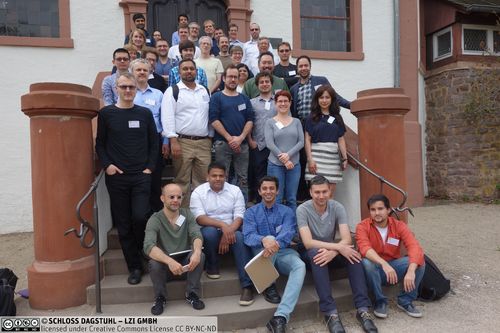
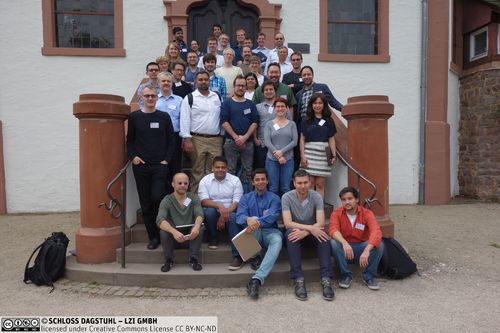
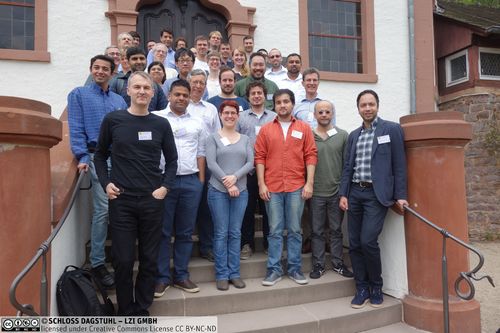
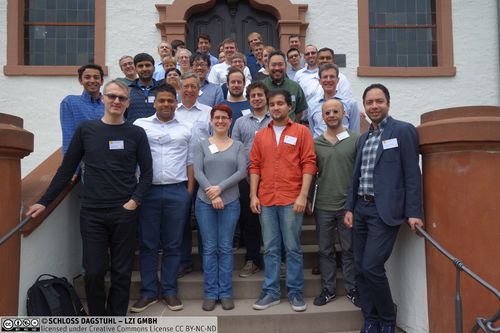
 Creative Commons BY 3.0 DE
Creative Commons BY 3.0 DE
